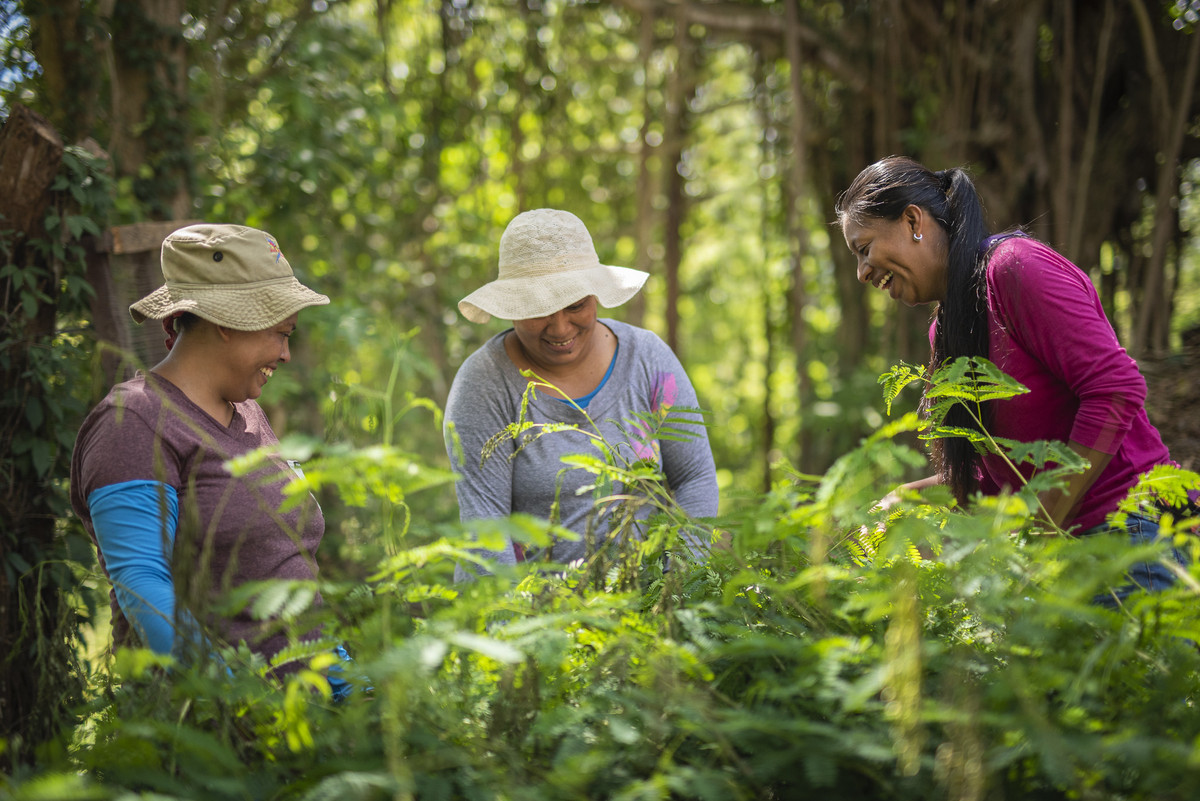10 ways forward to transform food systems for climate and nature
December 7, 2023

At the UN Climate Conference, COP28, more than 130 countries signed on to a Leaders’ Declaration on Food Systems, Agriculture and Climate Action. Over US$2.5 billion has been mobilized to support the food-climate agenda.
Food systems transformation is now being recognized as a significant part of the solution to the climate crisis and biodiversity loss. In climate, the latest IPCC Report (AR6) highlights that “land, water and food” adaptation and mitigation options offer the greatest potential in responding to the climate crisis. Implementing these options – including reduced conversion of natural ecosystems and agricultural carbon sequestration – will require a deep and wide-ranging transformation. In nature, UNDP has answered the crisis of biodiversity loss by launching its new Nature Hub under the headline “No climate without nature, no development without nature”, emphasizing the synergy between nature-positive approaches and climate and livelihood outcomes.
Meanwhile at COP28 in the United Arab Emirates, the Food Systems and Agriculture Agenda has been a priority as never before at a climate COP. For the first time, Heads of State and Government attending COP28 committed to a Leaders’ Declaration on Food Systems, Agriculture and Climate Action. Over 130 countries signed the Declaration – covering over 5.7 billion people, nearly 500 million farmers and 76 percent of the total emissions from the global food system. More than US$2.5 billion has been mobilized to support the food-climate agenda, including a $200 million partnership between UAE and the Bill & Melinda Gates Foundation.
The question now is how best to invest that money to achieve maximum impact. Getting the right answers is crucial for people and planet. UNDP’s Climate Promise highlights that agriculture, forestry and other land use accounts for nearly a quarter of all greenhouse gas emissions, uses 70 percent of total freshwater withdrawals, and one third of global produce destined for human consumption is lost or goes to waste. Meanwhile In developing countries, where farming is often the largest employer, it accounts for 60 percent of the labour force and produces 25 percent of GDP. Food systems and agriculture, therefore, are a key part of climate action.
About a third of the food we produce is lost or wasted, while hundreds of millions of people go hungry. Eliminating waste is key to a sustainable food systems transformation.
UNDP Food and Agricultural Commodity Systems (FACS) Senior Advisor Jose Luis Chicoma was formerly Minister of Production in Peru: “Agriculture carries a double burden because it is the sector most vulnerable to climate change but is also a major cause of the problem. So, it follows that it’s a big part of the solution too. We need to unlock the political will to address power imbalances and promote an accelerated transition to agroecology, placing smallholder farmers and artisanal fishers at the centre of the change.”
UNDP’s vision is to strengthen food systems so that they are sustainable, inclusive and equitable, healthy and resilient.
“We need a systemic perspective to promote a real transformation – for example, by accelerating a transition towards agroecology – with a whole-of-government approach that uses UNDP’s Effective Collaborative Action expertise in encouraging collaboration between ministries, acknowledging how to deal with and confront asymmetries and abuses of power, which in my experience is essential to success,” said Jose Luis Chicoma.
UNDP FACS is exploring 10 areas of action to drive food systems transformation. These routes to more sustainable food systems pave the way to accelerate our pace of change, and feed into the debate following the COP28 Leaders’ Declaration.
"Getting agriculture and food systems as one of the top priorities in the COP28 Presidential Action Agenda is a significant moment. A new future is possible."Jose Luis Chicoma, Senior Advisor, UNDP Food and Agricultural Commodity Systems
1. The first imperative is to improve the overarching framework – food systems governance. This starts with the ministries and agencies in charge of food systems, and includes other stakeholders, emphasizing the need to include and empower smallholder farmers, artisanal fisheries and other workers and small and medium enterprises in the food supply chain.
2. The future must be built on bottom-up systems-thinking approaches, political will for transformation, policies, programmes and investments that embrace complexity and systemic challenges, promoting policy coherence and policies that drive real change. Short-term responses must build up to long-term structural transformation at the national and subnational levels, strategically designing short-term actions that not only address immediate crisis but also contribute to reshaping fundamental aspects of the food system.
3. Strengthen social protection institutions and mechanisms and implement inclusive growth programmes that prioritize the most vulnerable to food insecurity. This includes supporting small-scale food producers with systemic policies that link food assistance initiatives to sustainable local food production, improving access to healthy and diverse diets through key channels like school meals programmes.
4. Make healthy and safe diets accessible and affordable to all, supporting governments to enhance access to affordable, healthy, local and safe diets while promoting sustainable food production such as agroecology that significantly reduces the use of chemical fertilizers, herbicides, pesticides and other harmful and dangerous inputs.
5. Address gender inequality so that women play a stronger role in food systems by securing women’s rights and control over land, capital and other resources across the food supply chain, prioritizing their access to social safety nets, enabling and empowering their participation in food systems governance platforms, and securing equal pay.

Transforming food systems will enhance access to affordable, healthy, local and safe diets.
6. Protect rich and diverse ecosystems by supporting governments to mainstream food systems in National Biodiversity Strategies and Action Plans to accelerate the transition towards sustainable agricultural practices, sustainable management of oceans, and sustainable aquaculture.
7. Reshape food systems to reduce their impact on climate change and enhance their resilience in the face of climate variations by increasing ambition in national climate plans and nationally determined contributions related to food systems, and implementing climate change mitigation and adaption policies, programmes and investments, prioritizing the support for the most affected and vulnerable.
8. Make food systems less dependent on fossil fuels, increase their use of renewable energies and agricultural and food waste as energy, and reduce the trade-offs in the land use between food and energy production.
9. All of the above are limited (or enabled) by the workings of the food value chain. Achieving these objectives will require new thinking around the food value chain, in particular diversifying domestic food production – by improving internal capacities to produce nutritive and resilient native crops – and reducing geographic concentration in the sources of food imports.
10. Strengthen shorter supply chains by supporting the capacity of territorial food markets, periodic rural markets, and street vendors to facilitate access to affordable, diverse and healthy diets.

Sustainable farming methods, such as agroecology, can increase crop yields while supporting healthy ecosystems.
"We also need to boost access to finance and a re-evaluation of subsidies and other public support which often produce unsustainable and inequitable outcomes. The leverage of food systems can be maximized through the National Adaptation Plans, nationally determined contributions, long-term strategies and National Biodiversity Strategies and Action Plans which countries are already implementing,” said Jose Luis Chicoma.
“We will never achieve the goals of the Paris Agreement without including agriculture and food systems, considering bold proposals and strong political will to confront long-standing obstacles and power asymmetries. Getting agriculture and food systems as one of the top priorities in the COP28 Presidential Action Agenda is a significant moment. A new future is possible: we have seven years before 2030, and no time to waste.”

 Locations
Locations




